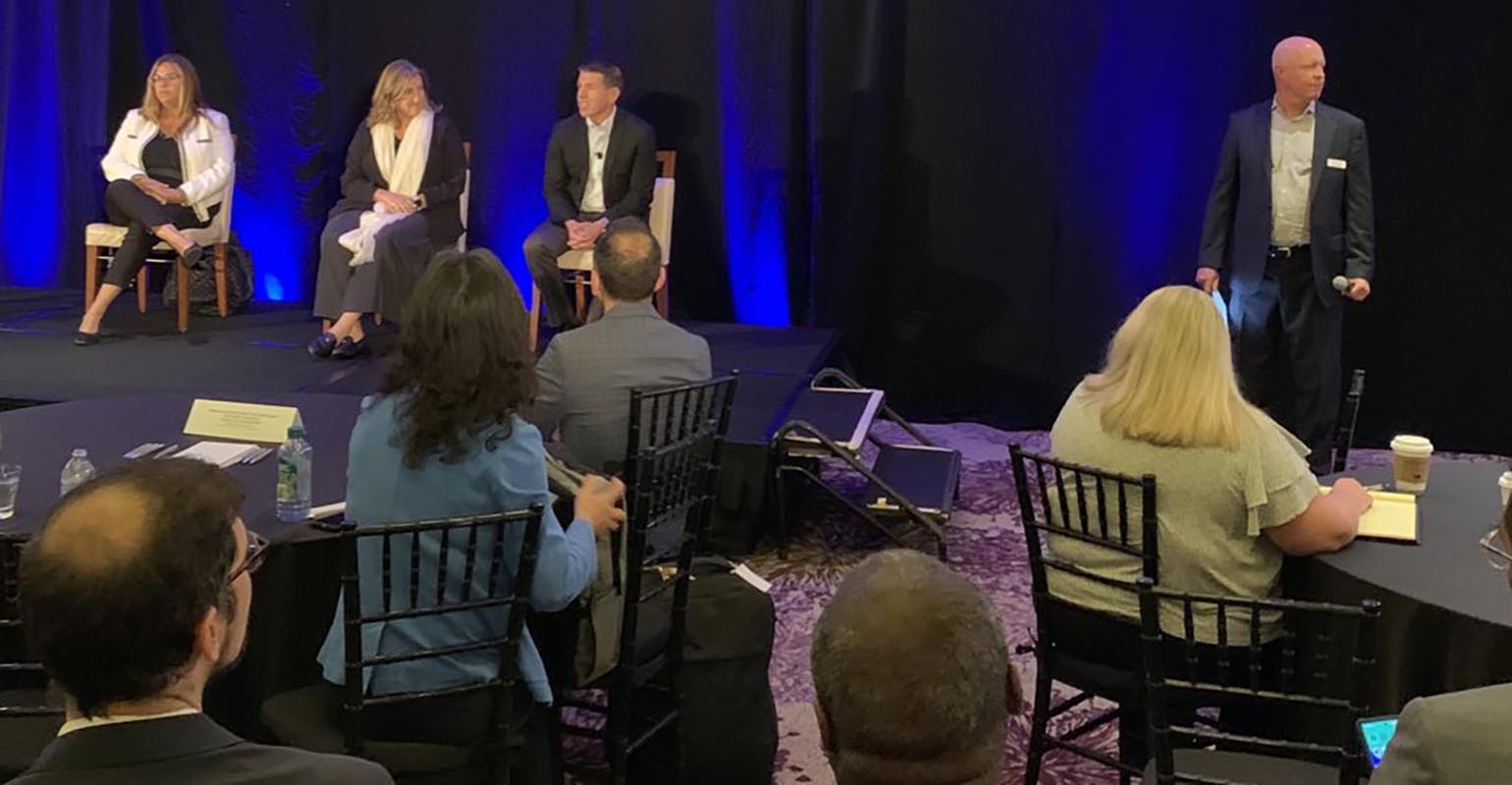Three executives, all finalists for WealthManagement.com's CTO of the Year award, recently discussed how their firms have implemented AI and what their roadmaps for the technology look like during an executive forum at the 2024 Industry Awards in New York City.
“We've been trying to inject AI into meeting conversations, meeting notes, which again, just saves a lot of time for our advisors — and actually, our clients are really interested in it,” said Paul Algreen, CTO of Cresset Capital Management. Many of the firm's advisors were initially nervous and reluctant for unfounded fear of client reaction.
“Clients love it,” he said of the results the firm is getting from using it Jump AIwhich is being used in a pilot program with Cresset advisors. The technology records and transcribes meeting notes and puts them into the firm's Salesforce CRM, where inputs can drive workflows and “get things moving,” he said.
“There's just zero latency, so we can really delight the customer by turning the action around very quickly, and advisors are loving it because they don't have to type notes anymore,” Algreen said.
“We've been using AI for a long time,” said Inez Louzonis, a managing director and head of Platforms and Capabilities at Merrill Lynch, noting that the firm's use extends to several forms.
This includes chatbots, like Bank of America's popular Erica, which supports retail banking customers, and a similar chatbot on the Merrill side that serves financial advisors.
“It's all the client's advisor or associate has to do and just ask that question in plain, normal language and then translate that answer in a very usable way,” Louzonis said.
Tuppy Russo, head of technology and customer operations at AllianceBerstein, said her firm rolled out its chatbot to its sales organization eight months ago to answer questions about its products.
“This was an increase in efficiency primarily in the alternatives space,” she said.
“We had a team that would answer these questions, 'When is the next shutdown?'
“Is this fund closed for ERISA?” 'What are the terms of liquidation?' And the same questions came to the same team over and over,” Russo said, noting how frustrating that could be, especially in light of her firm's 24-hour service level agreement with its clients.
She added, while this has been very successful, it required extensive testing prior to rollout to ensure accuracy, as well as monitoring and auditing on an ongoing basis to find questions that were not answered, incorrectly answered, or added.
“Everything we put in the hands of advisors, we want to make sure it's 100% accurate, because that, in turn, goes to the client,” Russo said.
“Where we can be a little more experimental and where we're testing with some other big language models, again, is around the product and answering the questions that we've asked our CIO team and our investment strategists,” she said, adding that strategists are responsible for the content in those products and there is less risk than an advisor giving clients incorrect information.
Cresset's Algreen described other ways his firm is using AI, specifically machine learning, to analyze investment portfolios and generate personalized summaries for its clients.
“It is not necessary to have an associate or customer service person trying to read all these reports and data in the time period before the meeting; all the portfolio information is now at their fingertips,” he said.
Another area where Cresset has found a strong use case for AI is in the firm's private equity and alternatives shops.
“We're doing a lot of the same document ingestion (the firm has been doing for years), but the tools have gotten much better than in the earlier days of optical character recognition, where it was very error-prone — now it's being ingested directly into a large language model, it's much more efficient and easier for us to debug as well,” Algreen said. The improvements have accelerated data reconciliation for Cresset's operations team.
Merrill's Louzonis also described other use cases.
“We have about 95 events that have been served on the adviser to take action on, from tax loss collections to records requests or notifying them of accounts that don't have beneficiaries in them.”
She said Merrill Lynch is also looking at note-taking and other communications analysis capabilities, but has not yet implemented them. However, when it does, she said it will likely have a firm-wide impact.
“We're not nimble at Merrill; we have systems built upon systems upon systems and the same data in multiple places, as just one example, taking that KYC document and putting that information wherever it needs to be,” she said across the firm.
Cybersecurity was another area where AI has a role for consulting firms, according to Cresset's Algreen.
“The take home message is that a year ago, I think all three of us would have said that the attackers are winning because they have all the AI tools, and we don't,” he said. “I think that has changed quite a bit in the last year and a half. I think some of the providers are really stepping up to help us use AI to identify threats, phishing and vulnerability management.
AllianceBernstein's Russo said her firm was also using AI in cybersecurity.
“We're fortunate enough to have a centralized team across the firm with the CSO, data protection officers and a whole team behind that,” she said.
“I think phishing is one of our main threats, and we've also put together AI; we used AI in email detection and were able to increase our email blocking by 20% using those capabilities,” said Russo.
“I think if your cyber team isn't using AI to combat threats, you should challenge them on that because there are tools available now,” Algreen said.

